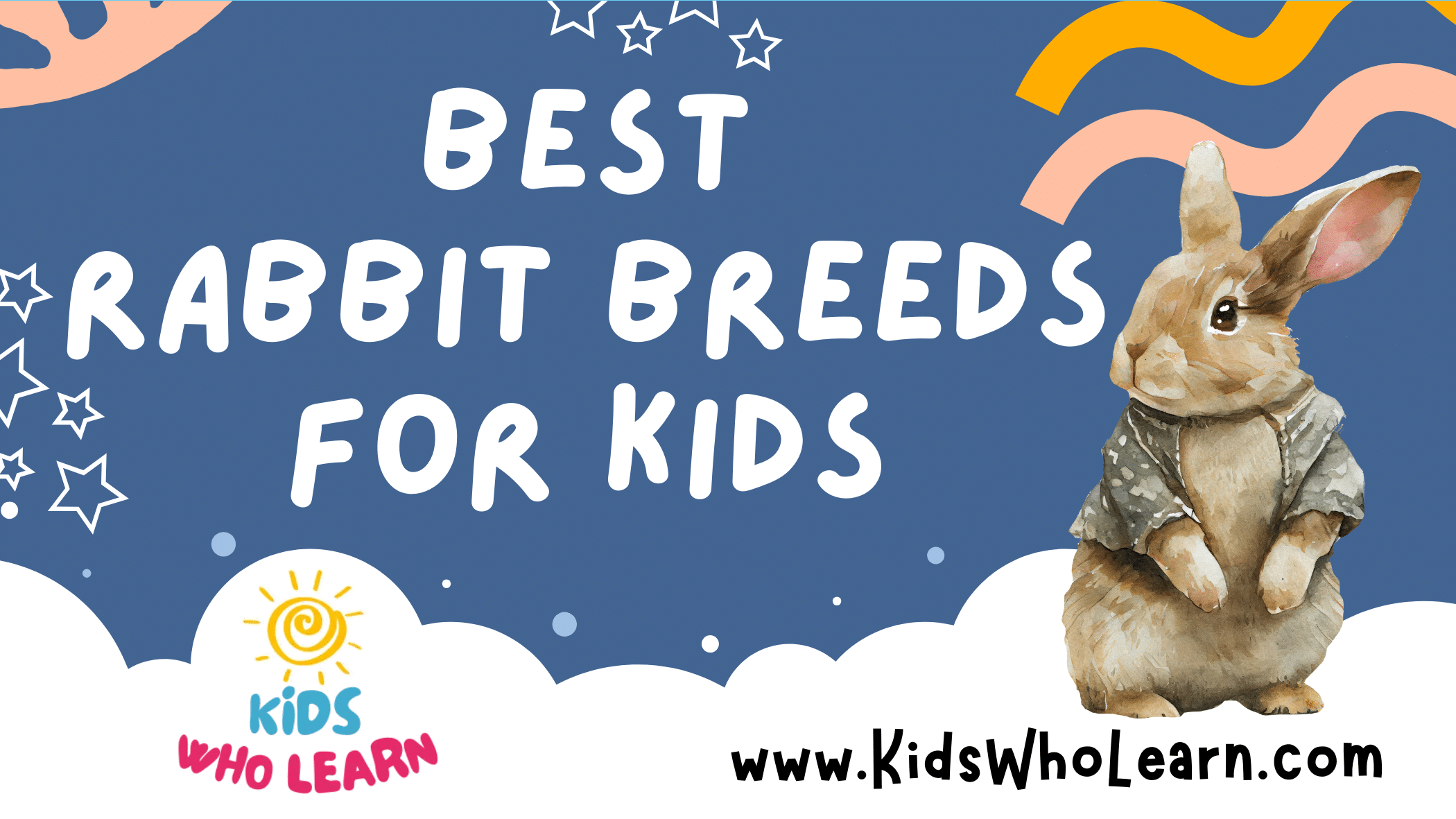Selecting the perfect pet rabbit for your family can be both an exciting and insightful journey. When considering a rabbit as a pet, it’s important to factor in the breed’s temperament, size, and care required to ensure it complements your household and lifestyle. Rabbits can be affectionate, sociable companions, particularly for children who are ready to learn about responsibility and empathy through pet care. However, not all rabbit breeds are equally suitable for young or first-time pet owners.
Kids often benefit from engaging with pets that are gentle, low-maintenance, and hearty. For this reason, certain rabbit breeds stand out as ideal choices. Breeds such as the Mini Lop, Dutch, and the Mini Rex are among the popular options due to their friendly demeanor and manageable size. They can provide a child with a rewarding experience of companionship and daily interaction. It is crucial to understand the care requirements—including proper diet, grooming, and exercise—for the rabbit breed you choose to ensure that your new pet thrives in its new home and that the experience is rewarding for both your child and the rabbit.
Key Takeaways
- Choosing a pet rabbit requires consideration of breed traits and care needs to match a family’s lifestyle.
- Gentle and low-maintenance rabbit breeds are preferable for children to foster a positive pet ownership experience.
- Understanding rabbit care is essential for ensuring the well-being of the pet and a rewarding family experience.
Considering a Rabbit as a Pet
When selecting a rabbit as a family pet, it’s critical to understand their characteristics, care requirements, and how they integrate into your lifestyle, ensuring they are a perfect match for both the rabbit and your household.
Traits of Rabbit as Family Pets
Rabbits can be exceptionally social and are known for their affectionate personalities, making them suitable pets for the family. They thrive in environments where they can interact with humans and receive regular attention. While they may enjoy being petted, it’s essential to approach them calmly and handle them gently to maintain their trust.
Child-Friendly Rabbit Qualities
The ideal rabbit breeds for children display a docile and friendly demeanor. Breeds like the Mini Lop and Dutch rabbit are known for their cuddly attitudes and tolerance for being handled. However, teach your children how to properly care for and respectfully interact with bunnies to build a lasting bond of affection.
Responsibilities of Rabbit Care
Responsible rabbit ownership involves routine grooming, exercise, and veterinary care. Rabbits need their living area kept clean and periodic grooming to prevent fur matting. They also require daily exercise outside their cage to stay healthy and happy, highlighting the importance of commitment to their care.
Size and Space Considerations
When considering a pet rabbit, assess the size they will grow to and the space you have available. Smaller breeds, such as the Netherland Dwarf, take up less room but may be more sensitive to handling, while larger breeds like the Flemish Giant require more space but may be more tolerant of children’s erratic movements.
The Lifespan of Pet Rabbits
Rabbits typically have a lifespan of 5 to 12 years, dependent on the breed and quality of care. This means a long-term commitment to providing love and care for the duration of their life, which is an important consideration when thinking about the right pet for your family.
Adopting vs. Buying
You can either adopt a rabbit from a shelter or buy one from a breeder. Adoption gives a second chance to a pet in need and can also provide you with a rabbit that may already be accustomed to handling and living with a family. When buying, seek reputable breeders who prioritize the health and temperament of their bunnies.
Popular Rabbit Breeds for Kids
When choosing a pet rabbit for your children, considering the breed’s size, temperament, and grooming needs is key to ensuring a good match for your family.
Dutch Rabbit
The Dutch Rabbit, known for its unique color pattern and friendly nature, is a top choice for kids. Their calm demeanor and easy-going attitude make them ideal first pets.
Mini Lop Rabbit
Mini Lops are among the most affectionate rabbits, with their floppy ears and docile personalities. They are small, which makes handling by children easier.
Holland Lop
Similar to Mini Lops, Holland Lops are friendly and can show a great deal of affection. Their sweet temperament ensures they’re a family favorite.
Chinchilla Rabbit
Chinchilla rabbits are known for their luxurious gray coat and good-natured character. They are generally friendly and make for a sophisticated-looking companion.
Harlequin Rabbit
Harlequin Rabbits have a playful and energetic demeanor. Their distinct coloration adds a unique flair and they appreciate attention and interaction.
Himalayan Rabbit
With a calm and pleasant temperament, Himalayan Rabbits are well-suited for families. Their striking appearance and gentle nature make them a great option for a child’s pet.
Lionhead Rabbit
The Lionhead Rabbit, with its distinctive mane, requires more grooming but is worth the effort due to its friendly and amiable nature.
Havana Rabbit
Havana Rabbits are known for their rich chocolate coat and affectionate personality. They can be a lovely match for children looking for a cuddly friend.
Californian Rabbit
Californian Rabbits are larger in size but gentle at heart. They are suitable for families who have more space to accommodate a bigger breed.
Florida White Rabbit
The Florida White is a smaller breed, ideal for smaller living spaces. They are known for their gentle nature and ease of care.
Thrianta Rabbit
The Thrianta stands out with its vibrant red coat. Although a rarer breed, they are friendly and can make a striking pet.
Satin Rabbit
Satin Rabbits boast a shiny coat with a satin-like finish, coupled with an agreeable personality that makes them a joy for kids to interact with.
Rex Rabbit
Rex Rabbits are cherished for their plush coat and enjoyable temperament. They’re friendly, which makes them compatible with a family environment.
American Rabbit Breeders Association Recognized Breeds
The American Rabbit Breeders Association recognizes many breeds that are suitable for children based on personality and care requirements.
Evaluating the Best Rabbit Breed for Your Family
When choosing a rabbit, evaluate its size, care needs, and temperament. This ensures your pet will integrate well with your family’s lifestyle.
Mixed Breed Rabbits
Mixed breed rabbits often combine the best traits of various breeds, making them unique and adaptable pets for children. Their characteristics can vary, so interaction before adoption is advised.
Rabbit Care and Maintenance
Proper care and maintenance of rabbits are essential to ensure that your pet thrives in its environment. Providing a balanced diet, a comfortable habitat, regular health check-ups, and ample grooming will contribute to a long and healthy life for your rabbit. Engaging regularly in socialization and exercise promotes both mental and physical well-being.
Diet and Nutrition
- Hay: Hay should be the cornerstone of your rabbit’s diet, specifically timothy, grass, or oat hay.
- Pellets: Feed a small, age-appropriate amount of pellets daily to provide extra nutrients.
- Vegetables: Introduce fresh vegetables to provide vitamins; some safe options include romaine lettuce, carrot tops, and parsley.
- Water: Always have fresh water available in a clean bottle or bowl.
Housing and Habitats
- Enclosure Size: A suitable cage should be at least four times the size of your rabbit when it’s fully stretched out.
- Flooring: Ensure the flooring is solid to avoid hurting their feet, with ample bedding for comfort.
- Location: Place the habitat in a quiet area away from extreme temperatures or predators.
Health and Wellness
- Check-ups: Regular veterinarian visits are crucial for vaccinations and to monitor overall health.
- Spay/Neuter: Consider spaying or neutering to prevent reproductive cancers and unwanted behaviors.
- Observation: Monitor your rabbit for any changes in appetite or behavior which could indicate illness.
Grooming Requirements
- Brushing: Rabbits need regular brushing, more often if they have a long coat or heavy undercoat.
- Nail Trimming: Keep your rabbit’s nails trimmed to prevent overgrowth and discomfort.
- Cleaning: Spot clean the cage regularly and do a thorough cleaning weekly.
Socialization and Exercise
- Daily Interaction: Rabbits are social and require interaction with their human caregivers for at least an hour daily.
- Safe Area: Allow your rabbit to exercise in a rabbit-proofed area where they can jump and play freely.
- Enrichment: Provide toys and puzzles to stimulate their intelligent minds.
Training and Behavior
- Litter Training: Rabbits can be litter trained; place a litter box in the corner of their enclosure to encourage this habit.
- Handling: Get your rabbit used to being handled to minimize stress; approach them in a calm and gentle manner.
- Positive Reinforcement: Use treats and affection to encourage good behavior and strengthen your bond with your rabbit. Avoid punishing your rabbit as this may lead to skittish behavior and can even provoke a bite.
Caring for rabbits requires commitment but also brings the reward of a friendly and playful companion. Your love and attention are crucial parts of their care, ensuring they feel safe and part of your family.
Getting Started with Your New Pet Rabbit
Welcoming a new pet rabbit into your home is an exciting journey for you and your kids. It involves careful preparation to create a loving and safe environment, as well as a commitment to long-term care, considering their needs for attention, exercise, and affection. The following guidelines will help ensure a smooth transition for your new fluffy family member.
Essential Supplies Checklist
Before your rabbit’s arrival, ensure you have the following items:
- Housing: An appropriate-sized cage or hutch
- Bedding: Safe and absorbent rabbit bedding
- Food: Pellets, fresh hay, fresh vegetables, and water
- Feeding Dishes: A sturdy food bowl and a water bottle or bowl
- Grooming Supplies: A gentle brush for regular grooming
- Chew Toys: Rabbit-safe toys for dental health and enrichment
- Exercise Pen: An enclosed area for safe, supervised play
Preparation for Arrival
Create a quiet space where your rabbit can feel secure without high traffic or loud noises. The area should be easy to clean and protect from potential hazards. Set up their cage or hutch with comfortable bedding, and make sure it’s a suitable environment regarding temperature and lighting. Preparing your children on how to gently handle and care for their new pet is crucial for building trust from the start.
First Days at Home
Give your rabbit a few days to adjust to their new surroundings. Start with short, supervised interaction sessions to allow your kids to familiarly introduce themselves to their new companion. Monitor your rabbit’s eating and bathroom habits to ensure they are healthy and comfortable in their new environment.
Building a Bond with Your Rabbit
Rabbits can be affectionate and sociable. Encourage your children to spend quality time with the rabbit, engaging in gentle petting and play sessions. Teach your kids to recognize the rabbit’s body language and respond accordingly, fostering a respectful and loving relationship.
Long-Term Commitment to Your Pet
Remind your family that caring for a rabbit is a long-term responsibility, with a lifespan of 7-10 years. Regular veterinary check-ups, daily exercise, and grooming are parts of their routine care. By consistently providing love and responsible care, your rabbit will become a cherished member of the family.
Legal and Ethical Considerations
Before deciding on a rabbit breed for your family, it’s crucial to consider the legal stipulations and ethical responsibilities that come with owning a pet rabbit. These considerations ensure proper care and compliance with regulations.
Laws and Regulations for Rabbit Ownership
When you’re considering adopting a rabbit, you must first be aware of local and national laws regarding pet ownership. It is your responsibility to ensure that rabbit ownership is allowed in your current place of residence and that you conform to housing and care regulations. Some areas require permits or have restrictions on the types of breeds that can be kept.
- Check with Local Animal Control or Government Agencies: Ensure rabbits are permissible pets.
- Research Zoning Laws: Certain breeds may have specific regulations.
Ethical Breeding and Adoption
Choosing to adopt a rabbit from a shelter or rescue organization is often seen as an ethical alternative to purchasing from pet stores or breeders. However, if you choose a breeder, verify they are affiliated with the American Rabbit Breeders Association (ARBA), which sets ethical standards for breeding and care.
- Adoption: Saves lives and helps combat overpopulation.
- Ethical Breeding:
- Affiliation with ARBA is a positive indicator.
- Breeder should prioritize health and temperament traits.
Wild vs. Domestic Rabbits
Understand that wild rabbits are not suitable as pets and that it is typically illegal to keep them. Your focus should be on domestic breeds that are accustomed to human interaction and can thrive in a family environment.
- Do Not Capture Wild Rabbits: It is illegal and unethical.
- Choose Domestic Breeds: Tailored to be more sociable and manageable for kids.
Community and Support Groups
Joining rabbit-specific community groups or online forums can be a great source of information and support. Groups often offer advice based on experience in the care and responsibility involved in raising rabbits.
- Seek Support: ARBA or local clubs can provide valuable guidance.
- Responsibility and Care: Learn from community experiences to ensure your rabbit is loved and well-cared for.
Conclusion
When selecting a rabbit for your family, it’s essential to consider breeds that are recognized for their gentle nature and ease of care. Encouraging your children to engage with a pet rabbit can foster responsibility and companionship.
| Rabbit Breed | Characteristics | Suitable for Kids |
|---|---|---|
| Holland Lop | Friendly, small size, easy to handle | Yes |
| Mini Lop | Calm, affectionate, enjoys interaction | Yes |
| Dutch Rabbit | Sociable, active, good-natured | Yes |
Rabbits are social animals and thrive in a loving environment. Be mindful that consistent and gentle handling from an early age helps in nurturing a well-behaved pet rabbit. Your guidance as a parent is crucial in teaching your children the proper way to care for their new companion.
Remember:
- Regular vet check-ups ensure your rabbit’s health.
- Provide ample space for your rabbit to explore.
- Diet should be high in fiber; always have hay available.
- Interaction should be supervised to ensure the safety of both the child and the rabbit.
By considering these factors, you can make an informed decision that benefits both your children and your new pet rabbit. Proper care and attention will lead to a rewarding experience for your entire family.
Frequently Asked Questions
Choosing the right rabbit breed for children involves understanding a breed’s temperament, care needs, and typical behaviors.
What are the top rabbit breeds recommended for children?
The Dutch, Mini Lop, and the Mini Rex are among the top breeds recommended for children. These rabbits tend to have calm, friendly dispositions and are of a manageable size for young handlers.
Which breed of rabbit is known for being the most friendly?
The Mini Lop breed is often cited as the friendliest rabbit breed, known for its sociable and easy-going nature, making it an excellent companion for kids.
Are there particular rabbit breeds that are better for beginners?
For beginners, the Dutch, Polish, and Himalayan rabbits are great choices. They are known for their docile nature, small size, and relatively easy care requirements.
What attributes make a rabbit breed suitable for children?
A suitable rabbit breed for children is typically gentle, approachable, has a moderate energy level, and can tolerate handling. Firm, yet gentle temperament is key.
Are some rabbit breeds considered to be more low-maintenance than others?
Yes, the Dutch and the Polish breeds are considered more low-maintenance due to their modest grooming needs and resilient health.
What should be considered when choosing a rabbit as a pet for a kid?
When choosing a rabbit for a child, consider the rabbit’s size, temperament, and the child’s ability to participate in routine care. Also, factor in potential allergies and the lifespan commitment to the pet.










